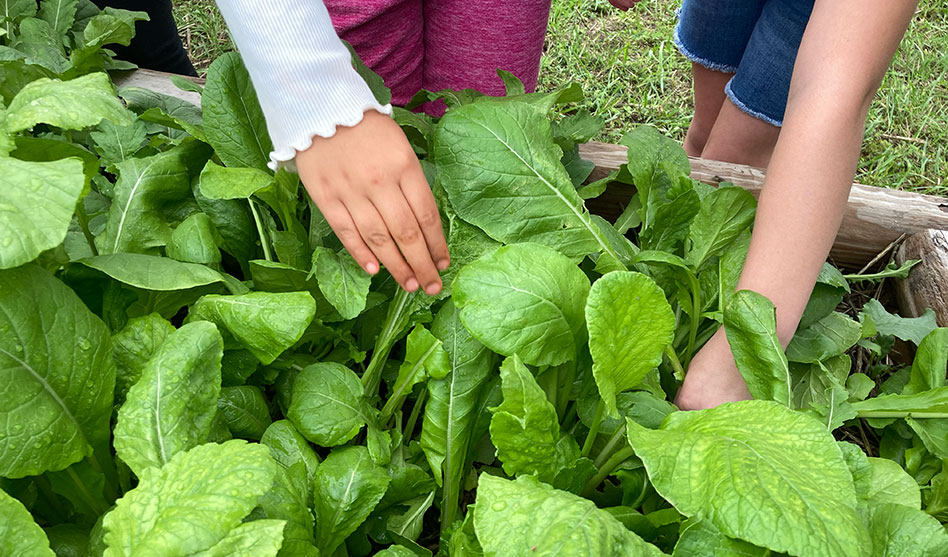The Madison School’s Growing Minds project, which is funded through USDA’s Healthy Meals Incentives Initiative, is planting seeds of lasting change that will increase the capacity of farmers to supply fresh, high-quality local food to schools in southeast Indiana. This 2.5-year Innovation Collaborative award–winner has emerged as a shining example of student-led innovation, collaboration and community impact. In just a few short months, the Growing Minds project has already made progress toward their vision.
Over the course of 2.5 years, Growing Minds aims to achieve the following objectives to collaboratively cultivate meaningful generational change for community members, school children and farmers alike. These changes include:
- A Farm Stop—a student-run, indoor local food marketplace—that will double the customer base for local farmers and supply three low-income and rural elementary schools with fresh, local food.
- School gardens that intentionally prepare students for leadership in the school food system and provide food for taste tests.
- Research and development on the creation of a food hub in the Jefferson County area that will connect farmers with schools, other institutional buyers and individual consumers.
- Cooking classes and listening sessions that taste-test family recipes for cafeteria use and empower families to choose fresh foods and use their voice to build a local food system that reflects their needs and preferences.
- Listening sessions and consultations across southeast Indiana to assist communities in building strong local school food systems and a network of growers who can fill supply gaps across the region.
Growing Minds will empower students to run an indoor local food marketplace, called a Farm Stop. Three schools will have access to locally grown foods, and farmers can connect with the schools and community members to sell their food. Locally grown foods will also be included in taste tests to support the development of new, student-approved menu items at the schools.
“We plan to conduct at least three county listening tours, visiting various stakeholder organizations/communities, conducting interviews and, where applicable, hosting targeted listening sessions,” said Laura Arico, president of local nonprofit Madison Youth Unlimited, a partner on the Innovation Hub grant. “The goal of these visits is to better understand the needs and [challenges] facing counties in southeast Indiana as they build their local food systems, as well as to begin creating a network of communities who can support one another in their school food system efforts.”
Combined with student-driven listening sessions and taste tests, these efforts weave together education and lasting menu changes that are responsive to the needs of students. To increase student engagement and empowerment, Growing Minds has started their project with a garden planting and training initiative that provides a foundation for taste tests throughout the growing season.
Just a few months into their grant, the leadership team led 85 third graders from Anderson Elementary in efforts to plant a fall garden. The fruits (and veggies) of their labor were enjoyed a few weeks later, in taste tests that put student wishes first for the development of locally driven lunchroom menu changes. Students planted lettuce, radishes and carrots to be featured in a celebratory salad, cooking classes and taste tests.
After planting seeds in raised gardens, students were brought back a few weeks later to see the progress. Children were excited to see the seeds already sprouting. Adult mentors shared that at least one student ran directly to where they had planted their seeds to point out the newly sprouted and bright green radish leaves. Children were in awe of how quickly the growing process happened. These intertwined efforts will contribute greatly to the sustainability of the project with enhanced intergenerational, educational and practical outcomes.
“Our programs are still mostly in their planning stages, but the Anderson school garden program is well underway,” shared Laura Arrico. The garden grew so quickly in the warm weather that the third graders already got to eat their celebration salad that was planned for the end of the growing season! This was a taste test during school lunch, and it included a mix of their own salad greens and radishes and some extra lettuce from a local farmer.”
Growing Minds partners were surprised and pleased by the number of kids asking for seconds and thirds on the salad celebration day. “My suspicion is that the kids were more willing to taste and enjoy these vegetables when they had spent a few months caring for the plants and developing an interest in them, as well as spending time learning about nutrition and sampling a new vegetable each week ahead of salad day,” reflected Ms. Arrico. We’ll see if that pattern plays out. If it does, it would really be a testament to the importance of meaningful garden time and nutrition classes as a way to help kids enthusiastically eat more fresh fruits and vegetables.”

